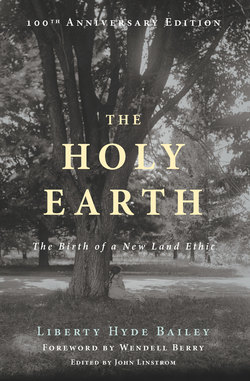Читать книгу The Holy Earth - Liberty Hyde Bailey - Страница 10
На сайте Литреса книга снята с продажи.
ОглавлениеTHE HOLY EARTH
First, the Statement
SO BOUNTIFUL hath been the earth and so securely have we drawn from it our substance, that we have taken it all for granted as if it were only a gift, and with little care or conscious thought of the consequences of our use of it; nor have we very much considered the essential relation that we bear to it as living parts in the vast creation.
It is good to think of ourselves — of this teeming, tense, and aspiring human race — as a helpful and contributing part in the plan of a cosmos, and as participators in some far-reaching destiny. The idea of responsibility is much asserted of late, but we relate it mostly to the attitude of persons in the realm of conventional conduct, which we have come to regard as very exclusively the realm of morals; and we have established certain formalities that satisfy the conscience. But there is some deeper relation than all this, which we must recognize and the consequences of which we must practise. There is a directer and more personal obligation than that which expends itself in loyalty to the manifold organizations and social requirements of the present day. There is a more fundamental co-operation in the scheme of things than that which deals with the proprieties or which centres about the selfishness too often expressed in the salvation of one’s soul.
We can be only onlookers on that part of the cosmos that we call the far heavens, but it is possible to co-operate in the processes on the surface of the sphere. This co-operation may be conscious and definite, and also useful to the earth; that is, it may be real. What means this contact with our natural situation, this relationship to the earth to which we are born, and what signify this new exploration and conquest of the planet and these accumulating prophecies of science? Does the mothership of the earth have any real meaning to us?
All this does not imply a relation only with material and physical things, nor any effort to substitute a nature religion. Our relation with the planet must be raised into the realm of spirit; we cannot be fully useful otherwise. We must find a way to maintain the emotions in the abounding commercial civilization. There are two kinds of materials, — those of the native earth and the idols of one’s hands. The latter are much in evidence in modern life, with the conquests of engineering, mechanics, architecture, and all the rest. We visualize them everywhere, and particularly in the great centres of population. The tendency is to be removed farther and farther from the everlasting backgrounds. Our religion is detached.
We come out of the earth and we have a right to the use of the materials; and there is no danger of crass materialism if we recognize the original materials as divine and if we understand our proper relation to the creation, for then will gross selfishness in the use of them be removed. This will necessarily mean a better conception of property and of one’s obligation in the use of it. We shall conceive of the earth, which is the common habitation, as inviolable. One does not act rightly toward one’s fellows if one does not know how to act rightly toward the earth.
Nor does this close regard for the mother earth imply any loss of mysticism or of exaltation: quite the contrary. Science but increases the mystery of the unknown and enlarges the boundaries of the spiritual vision. To feel that one is a useful and co-operating part in nature is to give one kinship, and to open the mind to the great resources and the high enthusiasms. Here arise the fundamental common relations. Here arise also the great emotions and conceptions of sublimity and grandeur, of majesty and awe, the uplift of vast desires, — when one contemplates the earth and the universe and desires to take them into the soul and to express oneself in their terms; and here also the responsible practices of life take root.
So much are we now involved in problems of human groups, so persistent are the portrayals of our social afflictions, and so well do we magnify our woes by insisting on them, so much in sheer weariness do we provide antidotes to soothe our feelings and to cause us to forget by means of many empty diversions, that we may neglect to express ourselves in simple free personal joy and to separate the obligation of the individual from the irresponsibilities of the mass.
